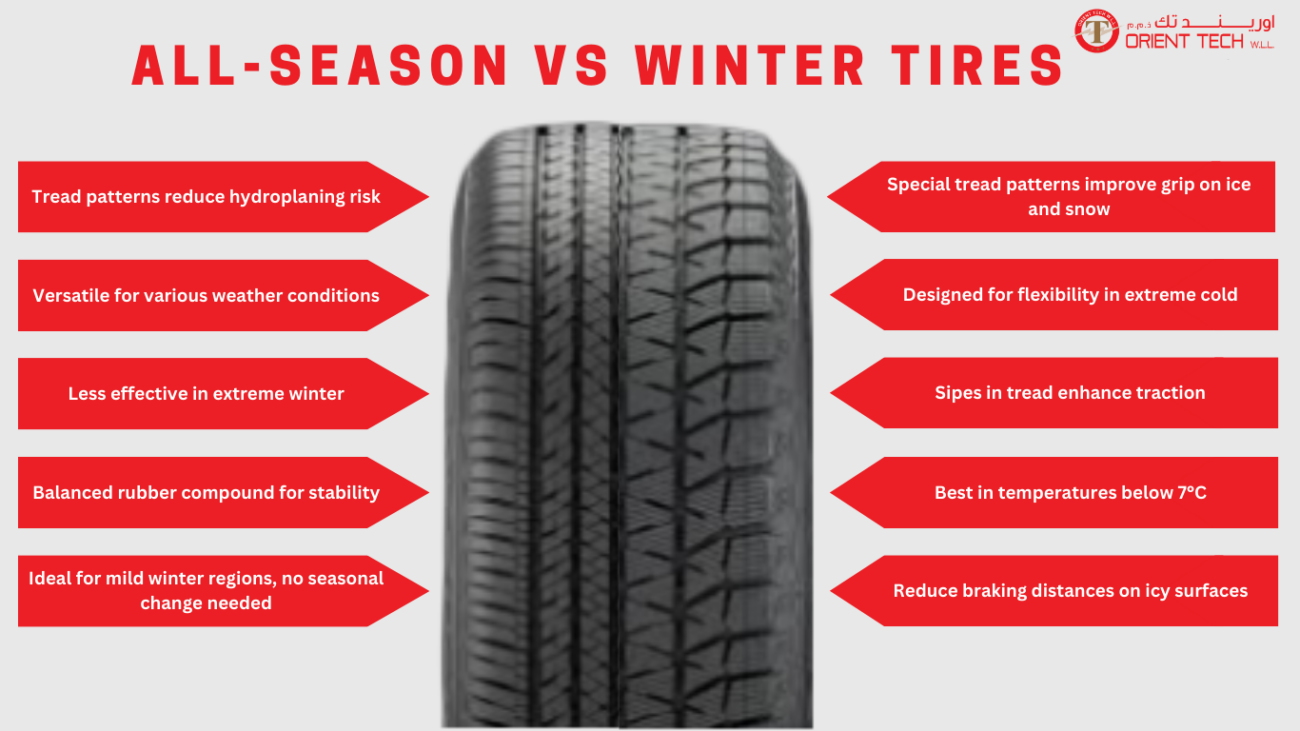What Are Winter Tires?
Winter tires are specifically designed to perform better in cold, icy, and snowy conditions. They feature a softer rubber compound that remains flexible even at lower temperatures, which helps maintain optimal grip and traction on cold roads. The tread patterns on winter tires are also deeper and more aggressive, designed to cut through snow and slush, providing a better grip on slick surfaces.
What Are All-Season Tires?
All-season tires are designed to handle a variety of driving conditions, including dry, wet, and light snow. They are a versatile option for drivers who experience mild climates throughout the year. The rubber compound used in all-season tires provides a balance between performance and longevity, making them a good choice for year-round driving. The tread pattern is moderate, designed to perform well on both wet and dry roads, but it doesn’t have the specialized features of winter tires.
While all-season tires can handle light snow and rain, they are not as effective as winter tires in extreme winter conditions. In climates where snowstorms, icy roads, and subzero temperatures are frequent, all-season tires may not offer the traction and safety required for safe driving.
Key Differences Between Winter Tires and All-Season Tires
1. Rubber Compound:
- Winter tires are made with a softer rubber compound that stays flexible in cold temperatures, offering better traction on icy and snow-covered roads.
- All-season tires use a harder compound that works well in moderate temperatures but can lose grip when temperatures drop too low.
2. Tread Design:
- Winter tires feature deeper treads with more aggressive patterns that allow them to grip snow, slush, and ice more effectively. They often have small slits or sipes in the tread, which enhance traction by biting into slippery surfaces.
- All-season tires have a more moderate tread design suited for dry and wet conditions. Their tread depth is shallower, and the patterns are less aggressive, which helps them perform well on paved roads but less effectively in snow or ice.
3. Temperature Sensitivity:
- Winter tires are ideal for temperatures below 45°F (7°C), ensuring optimal performance in cold weather.
- All-season tires can handle temperatures above 45°F (7°C), making them great for moderate climates but not ideal for harsh winters.
4. Traction in Snow and Ice:
- Winter tires perform significantly better on snow and ice-covered roads. Their tread design and rubber compounds are specifically engineered to prevent slipping, helping you maintain control during winter driving.
All-season tires can - handle light snow but are not designed to perform well on icy or heavily snow-covered roads. Their grip is limited, which can lead to dangerous driving conditions.
5. Longevity:
- Winter tires tend to wear out faster if used in warmer weather, as their rubber compounds are designed to remain soft and flexible in cold temperatures.
- All-season tires are built to last longer when driven in moderate conditions, but they don’t offer the same performance benefits in extreme weather.
Which Tire Is Right for You?
Winter Tires Are Ideal If:
- You frequently drive in regions with harsh winters, snow, and icy roads.
- Your driving includes mountainous or rural roads where snow and ice are prevalent.
- You live in a climate where temperatures regularly drop below freezing.
All-Season Tires Are Ideal If:
- You live in a mild climate where temperatures rarely fall below freezing.
- You don’t experience heavy snowfall or icy conditions on a regular basis.
- You prefer a hassle-free tire option that requires less seasonal maintenance.
Key Features:
Alpine Grip Design: Ensures excellent handling on wet and icy roads.
Silent Sidewall Technology: Reduces road noise for a quieter drive.
Driving Safety Indicator: Alerts drivers when the tire tread wears down.
Why Opt for Winter Tires in Qatar?
While Qatar does not face heavy snowfalls like many colder climates, winter tires still provide significant benefits during the cooler months. In Qatar, temperatures can dip unexpectedly, and when it rains or the roads get foggy, having the right tires can make a huge difference in terms of safety and performance.
Conclusion
Let us help you make the right tire choice for your safety and comfort this season!
 +974 55641343
+974 55641343  info@orienttech.com.qa
info@orienttech.com.qa
 +974 4451 2997
+974 4451 2997
